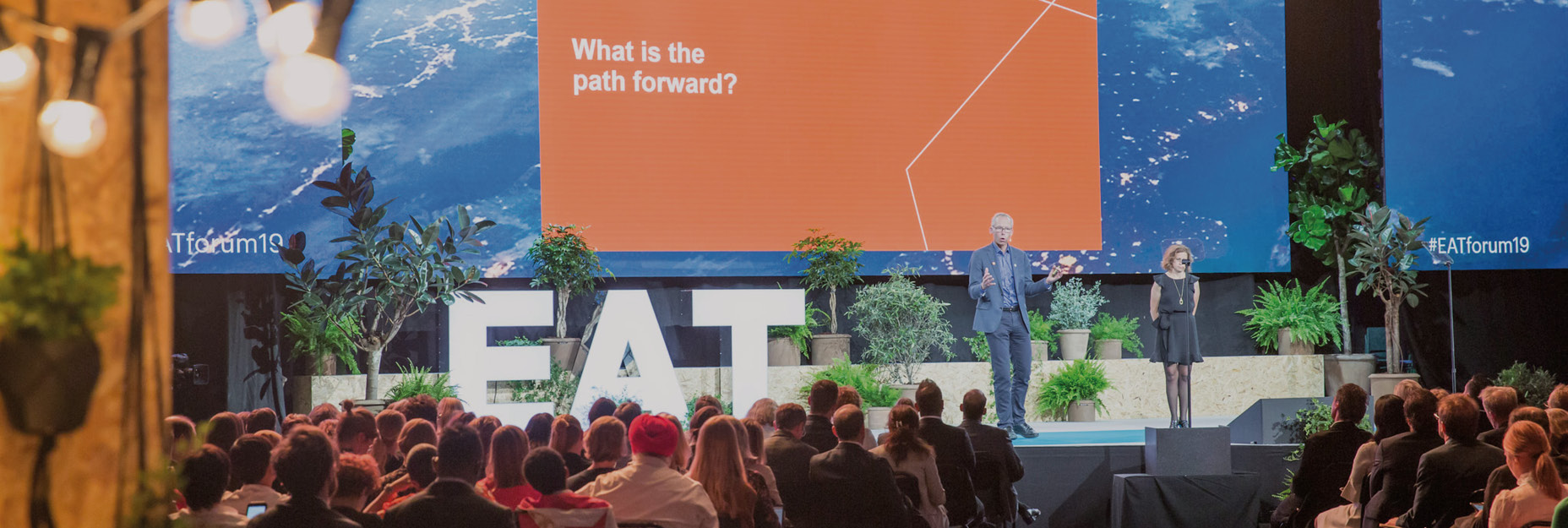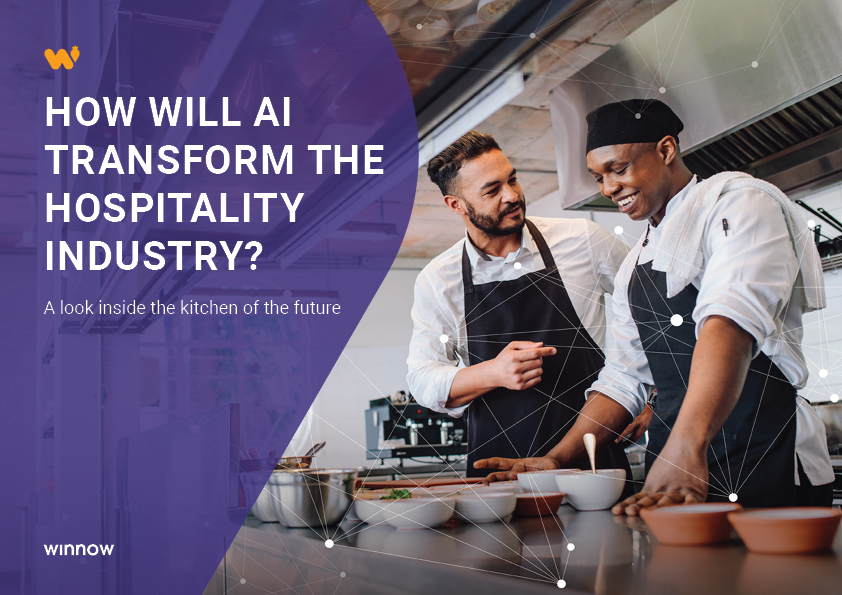There was an urgent tone to the conversations at EAT Forum in Stockholm this year. Every year, world leaders from governments, business and policy meet to connect the dots between food, health and climate. The theme was ‘The Science is clear: It’s time to act!’, reflecting the ticking clock that we all face to pivot the global food system towards a more sustainable future. Tackling food waste is critical to this important mission.
Gunhild Stordalen, Founder and Executive Chair at EAT, opened the conference referencing the rising attention (and growing frustration) from the general public at the slow pace of change regarding climate change. In many ways, this feeling has been embodied this year as Swedish activist Greta Thunberg has hit the headlines. At the age of just 15, she has sparked an international movement to combat climate change through school strikes. Outspoken and refreshingly direct, Stordalen quoted Thunberg’s powerful address to politicians saying:
“We owe it to the young people to give them hope.” But I don’t want your hope. I don’t want you to be hopeful. I want you to panic. I want you to feel the fear I feel every day. And then I want you to act.”
The EAT Lancet report asks the question ‘Can we feed a future population of 10 billion people a healthy diet within planetary boundaries?’. Authored by more than 30 world-leading scientists from across the globe, the report lays out one goal, two targets and five strategies.
The goal: To Achieve Planetary Health Diets for Nearly 10 Billion People by 2050.
The Targets:
- Healthy food
- Sustainable food production
The Strategies:
- Seek international and national commitment to shift toward healthy diets
- Reorient agricultural priorities from producing high quantities of food to producing healthy food
- Sustainably intensify food production to increase high-quality output
- Strong and coordinated governance of land and oceans
- At least halve food losses and waste, in line with UN Sustainable Development Goals
The report is a roadmap to create system-level change. Food is the single strongest lever to optimize human health and environmental sustainability on Earth. However, the way in which we produce our food is currently threatening both people and the planet itself. Alongside the first four strategies, accelerating progress in the global fight against food waste is pivotal in creating a more sustainable future. To give some context of the importance of the issue, food waste was ranked as in the 100 solutions to mitigate against the effects of climate change proposed by Project Drawdown.
Sustainable Development Goal 12.3 aims to halve per capita food losses and waste by 2030. We have seen some good movement since the introduction of the goals in 2015. Nations like Australia, the USA and Japan as well as the European Union and African Union have adopted the target. From the corporate side, Champions 12.3 report that 60% of the world’s largest 50 food companies have also adopted targets in line with the goal.
However, there is still much to do and as 2020 fast approaches, many would argue that a greater level of urgency is required if we are to have a realistic chance of meeting this important target. As such, the conversation at EAT revolved around where attention should be placed.
A number of new and innovative projects were on show at the conference. At the World Council for Sustainable Development’s side event exploring private sector engagement to reduce food loss and waste, Royal DSM’s William Wild shared a fantastic example of packaging innovation. Pack-Age helps reduce food waste in cheeses like Gouda and Parmesan. Currently, manufacturers suffer from wastage when cheeses are not protected during the ripening process. Product is also wasted when plastic coating and cheese crust is removed.
Pack-Age is a high tech packaging solution enveloping cheese with a breathable membrane. The natural rind is formed without the use of plastics which both reduces cut off waste whilst also reducing handling. DSM says that if all the global Gouda and Parmesan cheese would be ripened in Pack-Age, this could save around 200,000 tons of cheese every year.
On the kitchen stage in conversation with Winnow and EAT Forum CEO Dr Alessandro Demaio, Oz Harvest’s ever-energetic CEO and founder Ronni Kahn introduced a new project tackling aim at wasted fruit. Oz Harvest is Australia’s leading food redistribution charity.
Juice For Good is Australian-first vending machine that uses rescued oranges and provides a delicious, healthy option compared to existing vending machine beverage offerings. Nearly half of all Australian-grown fruit and vegetables do not make it off the farm - that’s a lot of product that could have been turned into juice.
Launched by For Purpose Co, an offshoot of Oz Harvest and partner of Winnow, the vending machines can now be found across Sydney. Since September last year, close to eight tonnes of less-than-optimum-looking oranges have been turned into juice.
Finally, WRAP development Director Dr. Richard Swannell presented at Winnow’s morning side event exploring where the focus should be placed to accelerate progress towards SDG 12.3. While working at WRAP he led the team that delivered voluntary commitments with businesses to tackle food and packaging waste, such as the award-winning Courtauld Commitment, and the internationally renowned Love Food Hate Waste consumer campaign. These initiatives have helped the UK reduce food waste by around 19%.
Swannell is now focussed on scaling the impact of the UK’s Courtauld Commitment internationally. REFRESH is a project with 26 partners from 12 European countries and China. These include leading universities, research institutes, private businesses, governments, civil society and other stakeholders.
The project takes an innovative, systemic approach to curb food waste through a holistic "Framework for Action". REFRESH builds on and goes beyond existing initiatives to develop, evaluate, and ensure the spread of social, technological, and organisational insights and practices related to food waste. This is underpinned with guidance to legislators and to help support effective governance to tackle food waste.
Leaving Stockholm one couldn’t help but leave inspired. Delegates from across the spectrum shared their own personal motivations to take the agenda forward in their respective governments and organisations.
Ronni Kahn from Oz Harvest eloquently encapsulated the feel of the event by sharing the story of ‘The Order of the Teaspoon’.
“I believe that if one person is watching a huge calamity, let’s say a conflagration, a fire, there are always three principle options."
- Run away, as far away and as fast as you can and let those who cannot run burn.
- Write a very angry letter to the editor of your paper demanding that the responsible people be removed from office with disgrace. Or, for that matter, launch a demonstration.
- Bring a bucket of water and throw it on the fire, and if you don’t have a bucket, bring a glass, and if you don’t have a glass, use a teaspoon, everyone has a teaspoon. And yes, I know a teaspoon is little and the fire is huge but there are millions of us and each one of us has a teaspoon. Now I would like to establish the Order of the Teaspoon. People who share my attitude, not the runaway attitude, or the letter attitude, but the teaspoon attitude – I would like them to walk around wearing a little teaspoon on the lapel of their jackets, so that we know that we are in the same movement, in the same brotherhood, in the same order, The Order of the Teaspoon.”
We know the science is clear. It is up to us as individuals to act. The time is now.
Photo credit: EAT Forum via Flickr









Comment on my blog